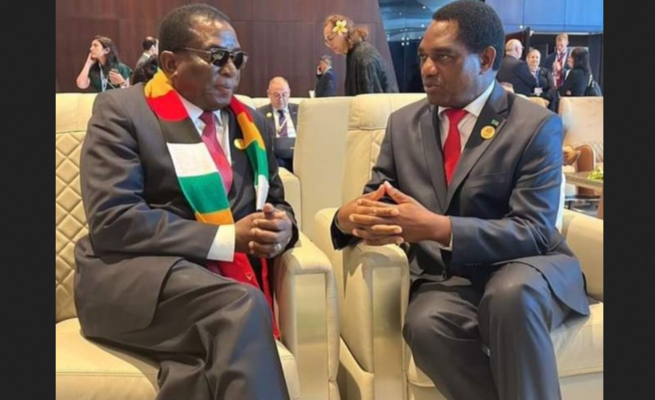
Leaders from Zimbabwe, Botswana, Namibia and Zambia have called for the expansion of the four-nation sub-regional World Children’s Day commemorations to include many SADC countries for the benefit of children in the entire region.
This came out on Sunday night during the 2023 World Children’s Day celebrations held in the coastal town of Walvis Bay, Namibia.
The commemorations ran from November 17 to 19.
Vice President Kembo Mohadi joined Namibia President Dr Hage Geingob, Botswana President Dr Mogkweetsi Masisi and Zambia’s Minister of Community Development and Social Services, Doreen Mwamba.
VP Mohadi was representing President Mnangagwa while Minister Mwamba represented President Hakainde Hichilema.
During their presentations, the leaders said the concerns raised by 100 children from the four countries mirrored the issues in other countries, hence the need to ensure no SADC or African child was left behind.
President Geingob started the discussion and all others concurred.
President Masisi said Africa presents an opportunity for the future since it has the largest reserve of fertile land, fresh water and the youngest population in the world.
“So, you need to build strong networks as African children and this continent forward. We need to share talents and open borders and converge as a region, we need to create employment for our children,” said President Masisi.
VP Mohadi said: “Your Excellencies, I want to concur with you that this body needs to be expanded. We need to expand it so that Africa becomes united.
“The unity that this fosters, among our children and us as the leaders of these four countries, is something that we would want to see happening regionally. I am so happy to see these children from the four countries mingling, discussing issues that concern them and also addressing us as their leaders, as to what they think should be done so that their situation is improved. It is only through this kind of dialogue, through this kind of platform that we can mould them into responsible leaders.”
The sub-regional commemorations of the World Children’s Day started in 2021 in Kasane, Botswana, before being taken to Lusaka, Zambia last year, and Walvis Bay in Namibia this year.
Children from the four countries who attended the World Children’s Day united in a call to action, presented to the leaders.
The children said there should be nothing for them without them, and said climate change was a child rights issue.
They also demanded quality education, and to live in environments that are safe from violence, adding that children with disabilities should access the same opportunities as others, among other concerns. Responding to some of the issues raised by children during a panel discussion, VP Mohadi said Zimbabwe had been strengthening its education, with the introduction of the Heritage-based Education 5.0 being a masterstroke, as it equips learners with skills to improve their lives after school.
VP Mohadi said Education 5.0 helped Zimbabwe fight Covid-19 successfully after universities were directed by the Second Republic led by President Mnangagwa to think outside the box and manufacture some of the required products such as personal protective equipment.
Local tertiary institutions also produced ventilators and medical oxygen, on top of face masks and sanitisers that were produced even by primary school learners.
“Our universities started making ventilators; those that assisted people to get oxygen.
“So, we said to our universities, can we get our own ventilators, and within a short space of time, they had come up with our own Zimbabwe branded ventilators. That is the result of our Education 5.0.
“We have also during that time, had a problem of getting oxygen for our patients. We could not get it from anywhere. We then approached our graduates and said can’t we have our own. And within a very short space of time, Verify Engineering came up with oxygen and we are now exporting some of it,” said VP Mohadi.
South African artiste and goodwill ambassador for the Roll-Back Malaria Partnership and the Unicef, Ms Yvonne Chaka Chaka, said she was disappointed that her country was not in the four-nation club, and pledged to “ask my President why.”
Turning to employment creation for young people, VP Mohadi said Zimbabwe has embarked on value addition and beneficiation of minerals and agricultural produce.
“We beneficiate them. We don’t allow them to be exported in raw form. So, when we beneficiate, we are creating employment and we are now also seized with what we call reverse engineering (where) some of the products we get from other countries, we end up producing some other things.
“I am saying this because we need, as Africans, as a region, to stand on our own, to have our own things,” said VP Mohadi.
Mineral value addition also boosts incomes, as has happened in Indonesia where that country’s nickel-related exports were US$6 billion in 2013, before jumping to almost US$30 billion last year driven by exports of higher value-added products such as stainless steel and battery materials.
Due to deliberate investments in education and agriculture, Zimbabwe has achieved “quite a number of things”, said VP Mohadi, including food security in respect of wheat and maize in the last three years.
Zimbabwe has so far surpassed all wheat production records since 1966, after 465 000 tonnes have been delivered, up from last year’s 375 000 tonnes.
The country’s annual national wheat demand is 360 000 tonnes of wheat to ensure uninterrupted supply of bread and confectioneries.
Meanwhile, VP Mohadi returned home yesterday afternoon.
He said the World Children’s Day commemorations were a success, adding that Zimbabwe will host the commemorations.
VP Mohadi and Zimbabwe Child President Neville Mavu were handed the Torch of Hope by Namibian paralympic gold medallist Ms Johanna Benson, an indication that Harare will host the next commemorations.
World Children’s Day is a global day of action for children, by children, marking the adoption United Nations Convention the Rights of the Child (UNCRC) on November 20, 1989.











